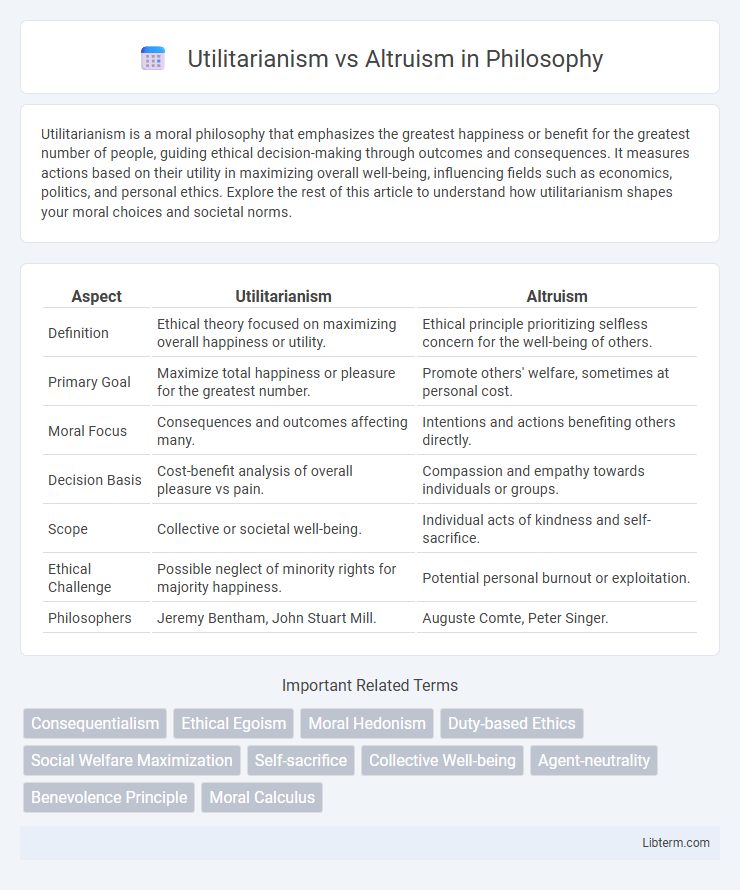Utilitarianism is a moral philosophy that emphasizes the greatest happiness or benefit for the greatest number of people, guiding ethical decision-making through outcomes and consequences. It measures actions based on their utility in maximizing overall well-being, influencing fields such as economics, politics, and personal ethics. Explore the rest of this article to understand how utilitarianism shapes your moral choices and societal norms.
Table of Comparison
| Aspect | Utilitarianism | Altruism |
|---|---|---|
| Definition | Ethical theory focused on maximizing overall happiness or utility. | Ethical principle prioritizing selfless concern for the well-being of others. |
| Primary Goal | Maximize total happiness or pleasure for the greatest number. | Promote others' welfare, sometimes at personal cost. |
| Moral Focus | Consequences and outcomes affecting many. | Intentions and actions benefiting others directly. |
| Decision Basis | Cost-benefit analysis of overall pleasure vs pain. | Compassion and empathy towards individuals or groups. |
| Scope | Collective or societal well-being. | Individual acts of kindness and self-sacrifice. |
| Ethical Challenge | Possible neglect of minority rights for majority happiness. | Potential personal burnout or exploitation. |
| Philosophers | Jeremy Bentham, John Stuart Mill. | Auguste Comte, Peter Singer. |
Introduction to Utilitarianism and Altruism
Utilitarianism is a normative ethical theory that evaluates actions based on their consequences, aiming to maximize overall happiness or utility for the greatest number. Altruism focuses on selfless concern for the well-being of others, often prioritizing others' needs above one's own interests. Both concepts address moral decision-making but diverge in their emphasis on collective utility versus individual self-sacrifice.
Defining Utilitarianism: Principles and Perspectives
Utilitarianism is a normative ethical theory that evaluates actions based on their consequences, aiming to maximize overall happiness and minimize suffering for the greatest number of people. Key principles include the greatest happiness principle and impartiality, requiring equal consideration of all affected individuals' well-being. Philosophers such as Jeremy Bentham and John Stuart Mill have significantly shaped utilitarian perspectives, emphasizing utility as the measure of moral rightness.
Understanding Altruism: Core Concepts and Motivations
Altruism involves selfless concern for the well-being of others, driven by empathy and moral obligation rather than personal gain. Core motivations include the intrinsic desire to help, social bonding, and the evolutionary benefits of cooperative behavior. This contrasts with utilitarianism, which evaluates actions based on their overall utility or happiness outcome for the greatest number.
Historical Roots of Utilitarianism and Altruism
Utilitarianism traces its historical roots to the 18th-century philosophers Jeremy Bentham and John Stuart Mill, who emphasized the principle of maximizing overall happiness or utility as the foundation of ethical decision-making. Altruism, originally conceptualized by Auguste Comte in the 19th century, centers on selfless concern for the well-being of others, contrasting with utilitarianism's broader focus on collective benefit. Both philosophies have evolved through intellectual traditions, shaping modern ethical theories and influencing social and moral policy development.
Ethical Foundations: Consequence vs. Selflessness
Utilitarianism centers on ethical foundations based on consequences, advocating actions that maximize overall happiness or utility for the greatest number. In contrast, altruism emphasizes selflessness, prioritizing the welfare of others without regard for personal gain or outcome-based calculations. This distinction highlights utilitarianism's outcome-driven approach versus altruism's intrinsic motivation to help others regardless of results.
Key Philosophers and Influential Thinkers
Key philosophers of utilitarianism include Jeremy Bentham, who introduced the principle of the greatest happiness, and John Stuart Mill, who refined this theory to emphasize quality of pleasure. Influential thinkers in altruism encompass Auguste Comte, who coined the term and advocated for selfless concern for others, and Peter Singer, who expanded altruistic ethics through his work on effective altruism and global poverty. The contrasting foundations lie in utilitarianism's focus on maximizing overall utility versus altruism's emphasis on self-sacrificial actions for the benefit of others.
Practical Applications in Modern Society
Utilitarianism guides public policy by promoting the greatest good for the greatest number, influencing healthcare resource allocation and environmental regulations. Altruism drives individual actions like charitable giving and volunteerism, fostering social cohesion and community support. Both ethical frameworks shape modern societal decisions by balancing collective welfare and selfless concern for others.
Strengths and Criticisms of Utilitarianism
Utilitarianism excels in promoting the greatest happiness for the greatest number, providing a clear, outcome-based ethical framework that facilitates decision-making in complex moral situations. Its strength lies in its impartial consideration of all individuals' well-being, fostering fairness and maximizing overall utility. However, utilitarianism faces criticism for potentially justifying harmful actions against minorities, neglecting individual rights, and struggling to measure or compare diverse forms of happiness objectively.
Strengths and Criticisms of Altruism
Altruism emphasizes selfless concern for the welfare of others, fostering social cohesion and moral integrity by encouraging acts of kindness without expecting personal gain. Strengths of altruism include promoting empathy, enhancing collaborative relationships, and supporting societal well-being through voluntary sacrifice. Criticisms highlight potential drawbacks such as neglecting self-interest, enabling exploitation, and sometimes leading to burnout or unrealistic expectations in sustaining altruistic behavior.
Utilitarianism vs. Altruism: Key Differences and Real-World Implications
Utilitarianism prioritizes actions that maximize overall happiness or utility, often evaluating the greatest good for the greatest number, whereas altruism emphasizes selfless concern for the well-being of others regardless of personal gain. Key differences include utilitarianism's consequentialist approach, focusing on outcomes, contrasted with altruism's intrinsic motivation to help others without expecting rewards. In real-world implications, utilitarianism often guides public policy and ethical decision-making by balancing societal benefits, while altruism drives individual acts of kindness and philanthropy.
Utilitarianism Infographic

 libterm.com
libterm.com